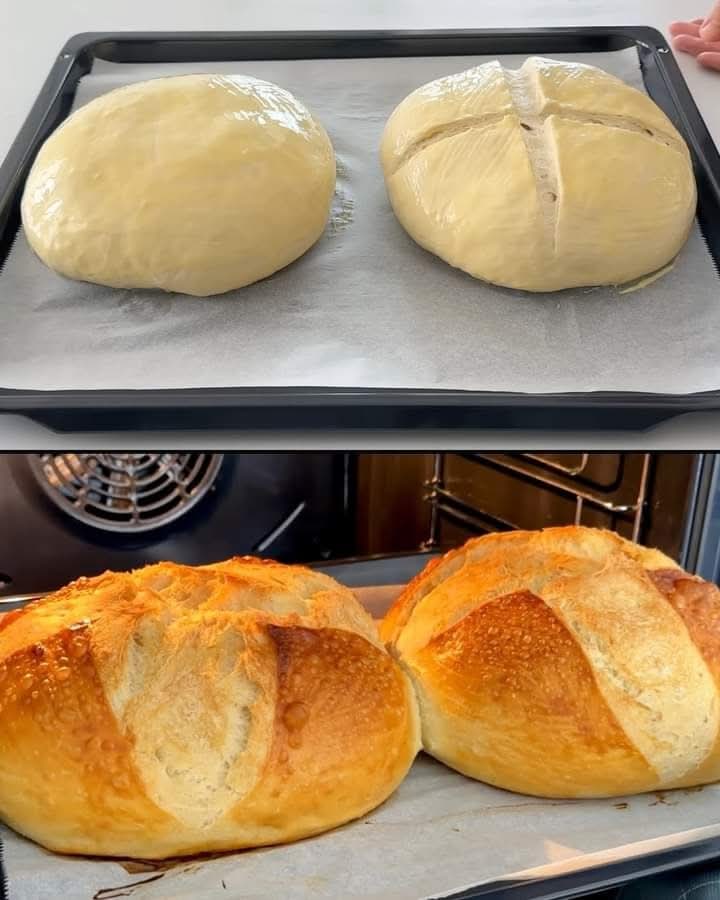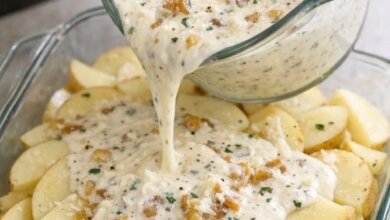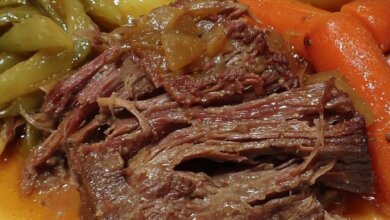All Recipes
Classic Homemade Bread: Soft, Delicious, and Easy to Make

Classic Homemade Bread: Soft, Delicious, and Easy to Make
Preparation Time:
- Prep Time: 15 minutes (plus 15 minutes of resting)
- Cook Time: 25-30 minutes
Ingredients:
- Dry Yeast: 10 grams (1 packet)
- Warm Water: 200 ml (1 glass)
- Flour: 720 grams (6 cups) + 120 grams (1 cup) for initial mixing
- Salt: 10 grams (1 teaspoon)
- Egg Yolk: 1
- Milk: 1 tablespoon
Directions:
- Activate the Yeast: Dissolve the dry yeast in warm water, stirring until fully dissolved.
- Initial Mixing: Incorporate 120 grams of flour into the yeast mixture, blending until smooth. Cover the dough and allow it to rest for 15 minutes.
- Form the Dough: Add 400 ml of warm water to the mixture, then gradually mix in 720 grams of flour and salt. Knead for 3-4 minutes until a soft, slightly sticky dough forms.
- Fermentation: Cover the dough and let it rise until doubled in size. Punch down the dough, divide it into two portions, and form each into a ball. Let the dough rest for 10 minutes.
- Shaping: Lightly flour your work surface, flatten the dough with your fingers, and roll it inward. Repeat with the second dough ball.
- Final Proofing: Place the shaped dough onto a baking tray, cover, and allow it to rise for an additional 20 minutes.
- Baking: Brush the dough with a mixture of egg yolk and milk. Bake in a preheated oven at 200°C (392°F) for 25-30 minutes or until the bread turns golden brown.
Serving Suggestions:
- Serve warm with butter or your favorite spread.
- Pairs perfectly with soups, salads, or as a base for sandwiches.
Cooking Tips:
- Use warm, not hot, water to properly activate the yeast.
- Avoid over-kneading to ensure the bread remains soft and light.
- If the dough is too sticky, sprinkle in a bit more flour as needed.
Nutritional Benefits:
- Homemade bread is a great source of carbohydrates, providing energy for the day.
- Compared to store-bought options, it contains fewer preservatives, making it a healthier choice.
Dietary Information:
- Contains gluten due to the flour used.
- Suitable for vegetarians.
Nutritional Facts (Per Serving):
- Calories: 150
- Total Fat: 1.5g
- Saturated Fat: 0.5g
- Cholesterol: 20mg
- Sodium: 300mg
- Total Carbohydrates: 30g
- Dietary Fiber: 1g
- Sugars: 1g
- Protein: 4g
Storage:
- Store in an airtight container at room temperature for up to 3 days.
- For longer storage, freeze the bread in a resealable bag for up to 3 months. Thaw at room temperature or warm in the oven before serving.
Why You’ll Love This Recipe:
- It’s simple and easy to follow with basic ingredients.
- The results rival bakery-quality bread, offering both a soft interior and a crispy crust.
- This versatile bread is perfect for a wide variety of meals and occasions.
Conclusion:
Making this classic homemade bread is a rewarding experience. The soft, flavorful texture makes it an excellent addition to any meal. With just a few ingredients and simple steps, you can create fresh, bakery-style bread in the comfort of your own home. Whether it’s for breakfast, lunch, or dinner, this recipe is sure to become a favorite in your kitchen.
Frequently Asked Questions:
- Can I use instant yeast instead of dry yeast? Yes, you can use instant yeast directly without dissolving it in water.
- What if my dough doesn’t rise? Ensure your yeast is fresh and the water is at the right temperature. If it still doesn’t rise, the dough may need a warmer environment.
- Can I substitute whole wheat flour for all-purpose flour? Yes, but the texture will be denser. You may also need to adjust the amount of water.
- How do I know when the bread is fully baked? The bread should be golden brown, and when tapped on the bottom, it should sound hollow.
- Can I add herbs or cheese to the dough? Absolutely! Incorporate herbs or cheese during the kneading process for extra flavor.
- How can I prevent the bread from being too dry? Avoid overbaking and ensure your dough has adequate moisture before baking.
- Can I make this recipe using a bread machine? Yes, follow your bread machine’s instructions for mixing and baking.
- What’s the best way to thaw frozen bread? Thaw at room temperature or reheat it in the oven for a few minutes.
- Can I use milk instead of water? Yes, but using milk will result in a denser loaf.
- How long should I let the dough rise? The dough should double in size, which typically takes about 1-2 hours, depending on the room temperature.



